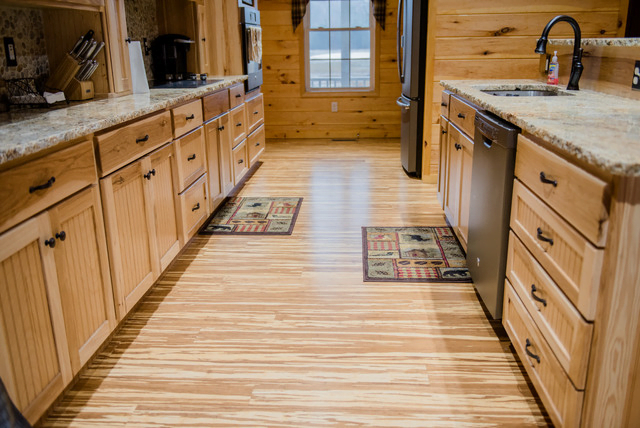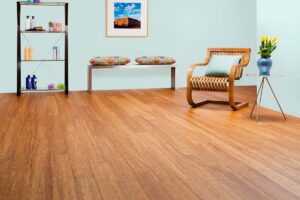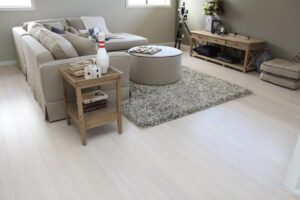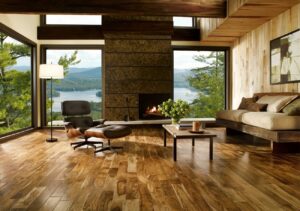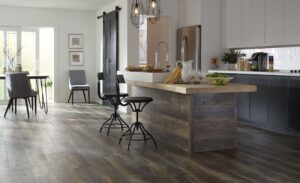Considering that kitchen is one of the most active home areas, not all bamboo flooring types are allowed to install in that space. However, if you insist on having this flooring, here is the bamboo flooring for residential kitchens we are going to recommend you under some specific reason.
Prior to the main topic, everybody should know that bamboo flooring comes in some different types along with the different properties and characteristics for each type.
Later on this article, we would also come with the related information such as the kitchen spills and stains, surface scratches and dents, ecological issues and style considerations.
Let’s get to know them all to gain a complete information about the bamboo flooring for residential kitchens.
3 Types of Bamboo Flooring
There are 3 types of bamboo flooring you can consider purchasing for your residential kitchens. Those are the solid bamboo floor planks, strand-woven bamboo and engineered bamboo.
Solid bamboo floor planks are specifically constructed from the solid bamboo fibers throughout the planks which are bonded using the adhesive resigns. The next type, strand-woven bamboo is similarly designed along with the bamboo fibers.
However, the fibers are woven at 90-degree angles to provide the bamboo with a hardness and strength. Either solid or strand-woven bamboo flooring can be refinished and sanded when they are just worn.
Different from the two types of bamboo flooring, the engineered version is constructed from the thin layer of natural bamboo to its backing material. Engineered bamboo flooring is more affordable than the other types.
It also comes with the good water resistance. The downside of this flooring is that the product cannot be refinished when it get worn.
Read Also: Bamboo Flooring Pricing and Installation Cost
Kitchen Spills and Stains on Bamboo Flooring
Due to the fact that kitchen is a home area with the high level of foot traffic, spills and stains are potentially occurring. This is the major concern you must consider just before you finally choose a flooring material for your kitchens. Spills and stains are the environmental stress fallen to the floor.
In this regards, kitchen must be pretty tough since the food and its ingredients tend to always spill, splash and splatter across the room, delivering a number of colorful staining agents pouring down on your wonderful floors.
This way, water along with the other liquids will mostly spill onto the floors for so many times while pots, pans and dishes will also occasionally attack the floors. So, whatever flooring types you are going to choose, these issues are importantly taken into account.
In relation to natural state, though bamboo is a natural material, untreated bamboo has only a little chance to floor the residential kitchens. It may be due to the fact that bamboo is less absorbent than the hardwood, making the liquids spilling on the floor seep in the material.
This leads to increase some issues such as mold, mildew growth and warping. Therefore, bamboo flooring for residential kitchens must be treated well using a proper sealing agent so that the top layer can be clear and impervious.
There are some bamboo sealing agents you may consider using to treat the bamboo. Polyurethane is one of the sealing agents which is particularly designed for bamboo flooring.
Optionally, wax is also available yet it is recommended only for commercial applications. It is because wax needs periodic industrial buffing.
Nowadays, bamboo flooring is available in many different options. Some of them are the pre-sealed and engineered flooring which are designed with a variety of thickness and invisible wear layer to provide the product with the protection on the surface. This is aimed to make the bamboo floors impervious to moisture and stains.
Surface Scratches and Dents on Bamboo Flooring
Though bamboo flooring is considered harder than any other hardwood flooring selections, it is still prone to scratches, marks and dents cause by many kinds of objects. Gauges can occur to bamboo floors when there are some unprotected furniture legs, unpadded high heels and pet nails.
Thus, some special treatment along with the prevention must be taken to care for the floors.
In this regards, prevention is the best way to protect your bamboo floors from any objects that cause scratches, dents and marks on the floors surface.
Firstly, you can lay rugs or mats at the entrance of the kitchen and other high-traffic areas. The rugs and mats will make the dust and other small particles tracked so that they would not stay on your bamboo floors.
If you have some heavy furniture in the kitchen, you are much recommended to provide the furniture legs with the protective pads. Thus, the floor will not scratch when you are rotating the furniture over time. Choose also the high-heels with pad, optionally, if you don’t, you can put them off when walking on the floors.
Now look at your pet. Do you have a large rambunctious dog at home? Don’t forget to trim its nails regularly. Sharp nails of dogs can absolutely scratches the floors and the marks may be very hard to repair.
For regular maintenance, sweeping and vacuuming can be the best way to clean the dirt, dust and other small particles that might accumulate on bamboo floors. If these tiny particles scrap across the floors, they can definitely tear the small groves passing by the surface finish. Times to times, they will cause discoloration to the bamboo floors.
Hence, it is crucial to know how to maintain the bamboo flooring for residential kitchens as well as to know what issues that occur so that you can do the prevention to keep the floors look good.
Once you install the bamboo floor in your kitchen, you must be able to notice every small particles and other issues that cause a floor damaged.
Environmental Issues
In fact, bamboo is a natural material which is the most highly renewable. If you find the trees need 20 years to reach maturity, bamboo can get its full maturity only in three to five years only. Furthermore, bamboo is not only recyclable but also biodegradable. Due to this greatness, bamboo has only a low level of environment impact.
Nevertheless, there are some important things to concern related to the bamboo manufacturing process. In this case, bamboos are planted as the most crucial crops and natural vegetation. They are planted and growing in Southeast Asia.
Thus, let’s concern about the impact of carbon dioxide gasses that release out of the vehicles transporting the bamboo from the fiends in Southeast Asia to the rest of world.
Health issues are another impact you should concern about bamboo flooring. Both solid and strand-woven bamboo flooring are constructed from the materials along with the adhesive resins to create dense planks. In this case, the adhesive resins may contain off-gassing of Volatile Organic Chemicals (VOCs) that can potentially cause allergic reactions.
Hence, if you live with people suffering from such allergy, bamboo flooring may not be the best option for residential kitchen. On the other hand, bamboo flooring is just fine for those who are not suffering from allergies.
Bamboo Flooring Styles To Consider
Bamboo flooring for residential kitchens is typically designed with a wide range of color selections like you may find in hardwood flooring. The color selections can even range from the light tan to the burn down.
To add more bamboo flooring styles, a large number of colors is painted and stained to bamboo. In relation to bamboo flooring color options, the darker colors are created through the process of carbonization. Badly, this carbonization process makes the bamboo floors less hard.
Bamboo flooring can be a good alternative in a residential kitchen compared to the wood flooring. It is due to the fact that bamboo is harder as well as more water-resistant than the wood.
However, moisture, humidity and flooding are still the big issues that can definitely damage the bamboo floors. So you must be aware of how to maintain the floors well based on the instruction and recommendation given by the manufacturers.
Pros and Cons
Before you finally choose bamboo flooring for your kitchens, it would better to know what strengths and weaknesses of the flooring. Clearly, you need to know the pros and cons of using this bamboo flooring in general.
Well, some reasons why people love bamboo flooring are the fact that the flooring comes with the renewable material, easy and low maintenance, aesthetical value and the ability to be refinished.
Meanwhile, some other people do not like to choose bamboo flooring because it is easily scratching, cracking due to the moisture and humidity and containing toxins in its adhesive resins which are not good for health.
Read Also: Ambient BP Bamboo Flooring Reviews for Home Renovation
Final Words Bamboo Flooring Kitchen
Finally, bamboo flooring for residential kitchens has its own characteristics, allowing you to consider many things before making a final decision.
Overall, keep thinking about the bad impact of bamboo flooring either on the environment or on your health issues. If you are just setting on this flooring, don’t forget to take more concern on how to maintain the floors well with minimum damage.
